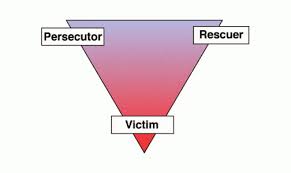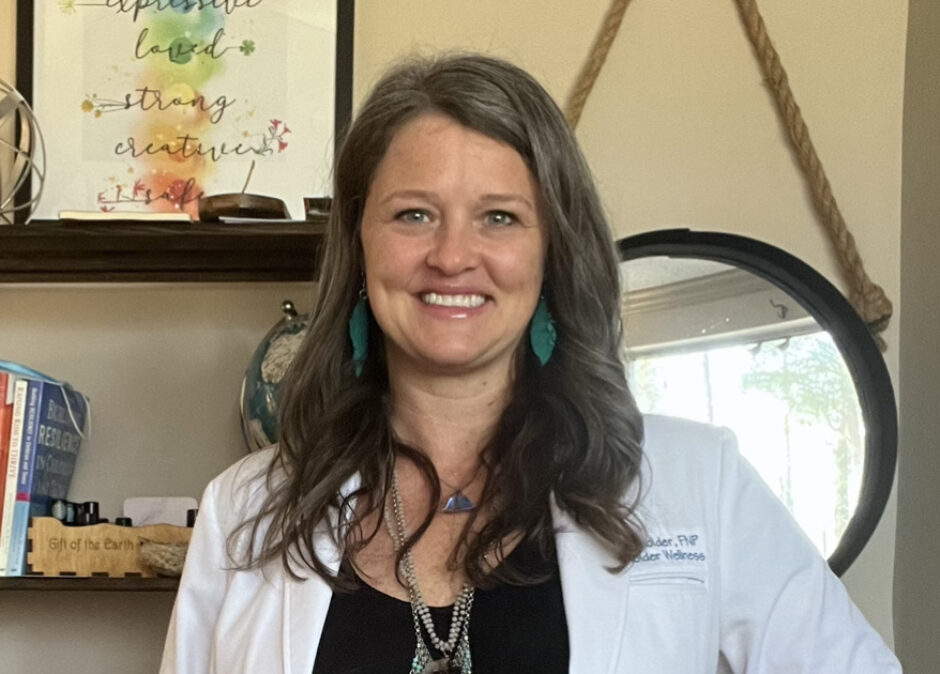
One of the theoretical tools I use a lot in my private practice, and even in my own personal life, is the one of the “victim triangle.” What is the victim triangle you might ask? Well, let me tell you, it can be very insidious and complex and it runs deep in dysfunctional families. However, its principles are fairly easy to understand and can be used as a guide to help lead us out of our “victim mentality.”
While almost every family has some elements of dysfunctionality (I mean, we’re all human after all), many have deeply dysfunctional roots and these patterns are continued and passed down from generation to generation, until someone decides to break these patterns.
The victim triangle is often originally attributed to Karpman’s Drama Triangle. The victim triangle principles that I am trained in and that I use were further discovered and/or built upon by psychotherapist and founder of Heart-Centered Hypnotherapy®, Diane Zimberoff. She wrote a great book about this: “Breaking Free From the Victim Trap: Reclaiming Your Personal Power.”
The victim triangle consists of 3 different roles that we play: the victim, the rescuer, and the persecutor. The paradox is that underneath all of these roles, actually lies the “victim,” hence why it’s called the victim triangle. The victim just takes on the role of the rescuer or the persecutor at times. And one can switch back and forth between all 3 roles, and frequently. However, most people tend to “live” in one of these primary roles the majority of the time, or at least until their eyes are opened to their own victimhood and how they are keeping themselves in this triangle.
The bad news is that we can get sucked into this triangle in the blink of an eye, without even being consciously aware of it. Many of us are in this triangle everyday, all day. The good news is that we can learn to step out of these victim roles and into an empowered role, with persistent self-evaluation, self-awareness, self-healing, self-love, and self-care. And just like anything else in life, it becomes easier the more we do it.
A quick summary of the underlying, often subconscious, beliefs of each of these roles are:
The victim often thinks: “Poor me. Someone save me. Everything always happens to me. Everyone is against me. Nobody loves me. Everybody hates me. Nobody cares about me. I’m nothing or nobody. Walk all over me.”
The victim often feels: Helpless, hopeless, powerless, oppressed, ashamed, inferior.
The rescuer often thinks: “Poor you. Let me help you. Let me save you. I can save you. I’ll enable you. I’ll put your needs before my own. I don’t have any needs. I take care of everyone else and their needs. I don’t even know what my needs are. Your needs are more important. Myself comes last. I’m a martyr. I’m only important if I’m helping or saving others. I’m only ok if you’re ok. Your mood and feelings determine my mood and feelings.” The rescuer is the classic codependent.
The rescuer often feels: Guilty when not helping or saving others, resentful because they’re always helping others with nothing in return (although they won’t allow anything in return), exhausted and depleted from giving so much of themselves away.
The persecutor often thinks: “It’s all your/his/her/their fault. I have to blame someone or something else. I will hurt you before you can hurt me. I will control you. I will criticize you. I will lash out and be angry with you. I will talk down to you. I am authoritative. I am superior to you. I will oppress you.”
The persecutor often feels: Angry, rageful, slighted, pissed off, bitter, superior.
Remember underneath all 3 of these is actually a victim. The victim is just really stuck in the oppressed, victimized role. The rescuer is trying to rescue everyone else because underneath, he/she is actually the one (the victim) who needs to be rescued. The persecutor is so afraid of appearing “weak” or as what they really are (the victim) that he/she overcompensates in order to hide their own victimhood by making everyone else their victim.
Furthermore, underneath all of these roles, lies the perceived lack of power. This perceived lack of power was often created in childhood, when the person actually was a helpless victim with an actual lack of power at one time. More on this later.
I am really going to focus on the “rescuer” role here, just because this happens to be one of the biggest groups of people I see in my practice. And to be honest, in my opinion, I believe it is because the rescuers are typically the ones who are seeking help. The persecutors are often too busy blaming everyone else for their issues and problems. The victims are also often too busy blaming everyone else for their issues and problems. Neither of these two roles are very good at taking healthy self-responsibility or self-accountability, at least not until they become aware of the roles they are playing.
It is also the rescuers who often go into “helping” and “healing” fields because they are often, either consciously or subconsciously, seeking “help” and understanding for their own issues and they often have a strong drive to help others with the same or similar types of problems – which is a beautiful gesture. But remember, this driving need to help others often stems from a subconscious need to actually rescue oneself, but that gets projected onto everyone else. Helping others is a very noble and wonderful thing; however, with rescuing it becomes extremely unhealthy. The energy behind it becomes that of a compulsive drive to rescue or save others, even to the detriment of oneself, often putting oneself at the very bottom of the rung. It often becomes self-abuse because of the lack of self-care and self-love. There’s a difference in rescuing people and helping people, and that difference will become more clear as we dive into the victim triangle.
Stay tuned for more on the victim triangle…
In the meantime, start thinking about how you may reside in one of these as a main role, or how you could be switching between the 3. Hint: We all fall somewhere on this triangle either sometimes or the majority of the time. The good news again is that we can get out of this triangle and step into our own personal power.
Liz Burkholder, FNP
Burkholder Wellness
Family Nurse Practitioner, Advanced Clinical Hypnotherapist, Trauma Specialist

Wow Liz,
I most certainly can see myself in each role at various times! I know for sure the cure is love, compassion, and understanding!! I also experienced how difficult it can be to get there!!! Looking forward to hearing your heartfelt and wise advice!
Love,
Catherine